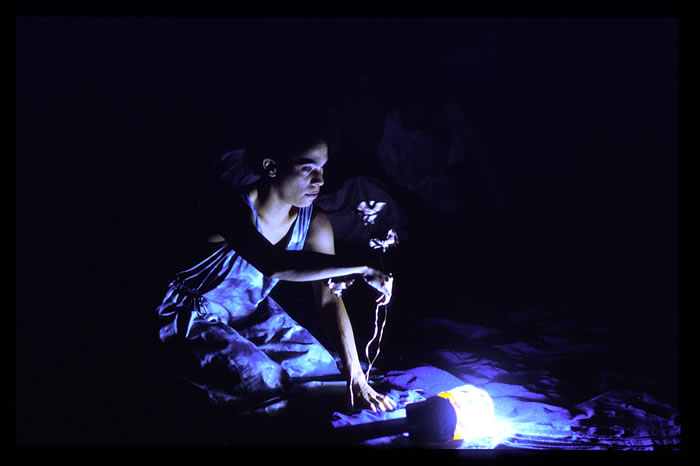A celebration of 25 years of San Francisco's Theatre of Yugen.

A celebration of 25 years of San Francisco's Theatre of Yugen.
A killer walks in a circle, finds a killer, circles the killed. Experimental writer Erik Ehn’s latest play about the violent and universal cycle of life follows the tragedy of Emmett Till and his mother that helped spur the Civil Rights Movement as well as three other stories, illustrating America’s history of violence towards those most vulnerable. Society cannot hide from any of this, from losing, moving, seeing, longing. This poetic and lyrical play creates a unique world where the victims are allowed to show the killer himself again, and again, despite...
Cast: Francesco Andolfi, Richarda Abrams, James Edward Becton, Carlotta Brentan, Kaela Mei-Shing Garvin, Trevor Latez Hayes, Bob Jaffe, Laura E. Johnston, James B. Kennedy, Adin Lenahan, Joyce Miller, Kathleen O’Neill, Neil Tyrone Pritchard, Gina Marie Russell, Sawyer Spielberg, David Stallings, Ken Straus, Harold Surratt, Perri Yaniv, and Kayte Zhang
Director: Glory Kadigan
An Erik Ehn play cycle based on traditional folk tales, Swedish Tales of Woe filters the elements of fairy tales through Ehn's language acrobatics. Among the characters inhabiting this world are giant, talking, conniving animals; a Gypsy Prince, trolls, and the Sun and Moon. All are represented through actors in mask, puppets, dance and animation.
Cast: John Athas, Kevin Nash, Erin Neal, Russell Pickering and Claire Wladis
Director: Bruce DuBose
Cast: Cameron Cobb, Nick Brisco, Newton Pittman, Mariana Celander and Julie Plummentaz Director: Bruce DuBose
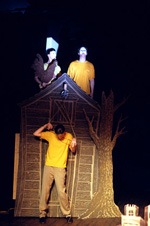

Adapted by Ralph Lee and Erik Ehn from the 1671 play Psiche, by Moliere and Pierre Corneille—with additional scenes from Love's Mistress by Thomas Heywood (1640)—Psyche employs actors, masks, puppets, music and dance to tell the ancient Greco-Roman myth of the young princess whose beauty rivals that of the goddess Venus, thereby incurring Venus' envy and the love of Cupid (who has been sent to wreck havoc on the innocent Psyche). The production of Psyche is designed to reflect the sensibilities of the grand court entertainments of Louis XIV, who requested the production from Moliere. Moliere, who had one month to ready the play before Lent, created the scenario and wrote three scenes before enlisting the aid of Corneille to create verse dialogue for the rest of the play.
Cast: Scott Blumenthal, Doris DiFranecio, Clea Rivera, Jessica Smith, Brian Voelcker, and Sam Zuckerman
Director: Ralph Lee
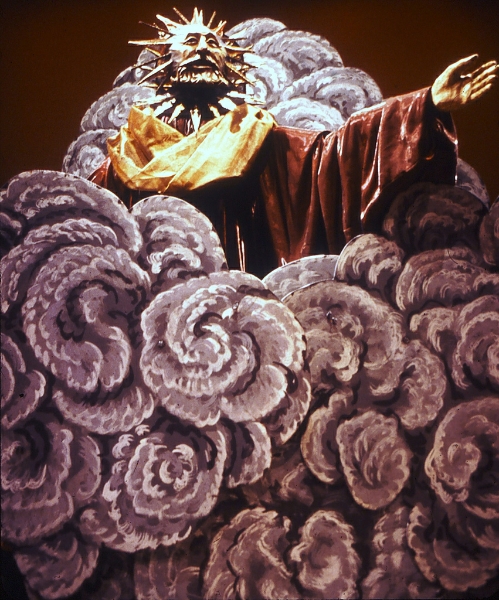

Theatre of Yugen is known for cross-cultural fusion work, and this Japanese Noh and Native American inter-cultural creation is one of its finest examples, featuring performers from the American Indian Dance Theatre and Japanese Noh artists. Written by celebrated playwright Erik Ehn, Moon of the Scarlet Plums is based on the historical figure of the Oglala Sioux Indian chief known as Crazy Horse. The play is rich in spiritual themes that are shared by the two cultures, holding out an example and hope for international collaboration and mutual understanding, so particularly vital at this moment in time.
Moon of the Scarlet Plums had its first incarnation as Crazy Horse in 2001 in San Francisco as part of the 50th anniversary celebrations of the US-Japan Peace Treaty. The project's two years of development had its fateful culmination on the weekend following the September 11th terrorist attacks. The cast decided to complete the project, not knowing if anybody would show up for the foggy outdoor torch-lit performances at Japantown's Peace Plaza. In fact, the audience turnout doubled in its capacity, with rows of standing witnesses hungering for an experience that could bring together two apparently disparate cultures in a meaningful way. The ritual nature of the performance and the mutual respect inherent in the two forms was complemented by the beauty of music, dance and story.
Director: Yuriko Doi
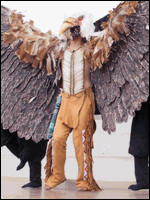

Frankenstein is adapted from Mary Shelley's classic novel by Erik Ehn with Theatre of Yugen. The story of Frankenstein's monstrous creation has fascinated artists in many disciplines since Mary Shelley first enshrined the rage and loneliness of the Monster in the public consciousness during the early 19th century. Ehn has pared down Shelley's text in an interpretation that uses the intense, restrained and stylized acting style of Noh to capture the constricted emotional tone and horror of the play.
"Muck in a bucket" explains Ehn. "The production focuses on three main qualities: small, careful, frightening." Design concepts revolve around the contrast of darkness and light, as themes of isolation and obsession contrast those of hope and natural beauty.
Cast: Jubilith Moore, John Oglevee, Lluis Valls, Libby Zilber and Max
Directed by Erik Ehn


Punks in New York. Music by Chris Cowwanko; lyric And book by Erik Ehn.
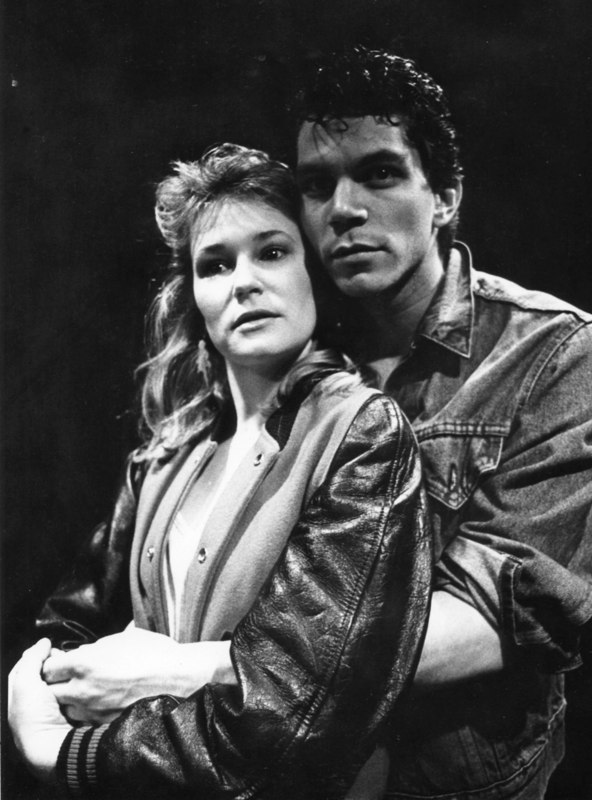

Invisible Glass (a term for a kind of glass that is polished to eliminate reflections) is a full stage puppet-theater work, incorporating actors, a highly artificial set consisting of a series of moving walls, a variety of puppetry forms, shadows and projection, and original music to create an atmospheric world of escalating tension, where appearances are deceiving and no one can be certain of anything.
Working with Erik Ehn's script, based on Edgar Allen Poe's story "William Wilson," Invisible Glass explores the idea of the doppelganger, a figure/concept which undermines our fixed notions of a unified or stable self or history, and often arouses curiosity and fear. The idea of the doppelganger suggests a construction of meaning through the metaphor of the body. In Poe's story, a young man arrives at a new school, only to find that there is someone there who carries the same name. In fact, there are many similarities that the two William Wilsons share. One of their main differences, however, is that the second William Wilson, because of a childhood illness, speaks only in a whisper. The story follows William Wilson for many years, as his schoolboy pranks evolve into adult crimes. The double William Wilson begins to take on more and more of his physical characteristics, but, unlike many stories of the doppelganger as a figure who embodies our worst impulses (Dr. Jekyll and Mr. Hyde), the doppelganger in Poe's William Wilson is primarily a moral figure.
Puppetry allows for a layering of figures and identities, further doubled by the use of actors who not only speak for the two William Wilsons, but eventually fully enter the action of the play. Additionally, the puppet William Wilsons grow throughout the piece from small—a tiny naked figure—to rod puppets, to 1/2 life-size bunraku figures, to life-sized figures. As the play escalates, all figures occupy the stage, as William Wilson's fragmented state of mind brings about his own death. The set is flexible and evolving, and makes selective use of mirrors, heightening the idea that no one can be certain that what is seen is really there.
Director: Janie Geiser
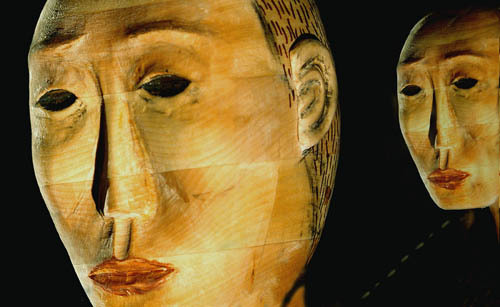

Director: Scott Feldsher
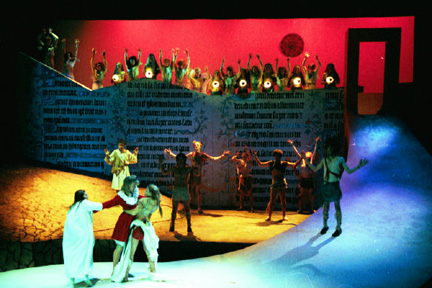

Cast: Sarah Gunnel, Dana Hooley, Bruce McKenzie
Director: Scott Feldsher


A University of Iowa Partnership in the Arts production dedicated to creating a theatre piece entirely through improvisation and exploration in rehearsal. The cast, composed of two members of Belgrades Dah Theatre, two American actresses, University of Iowa students, and community members, worked under Erik Ehn's guidance in response to a passage from the Bible: And it came to pass, when men began to multiply on the face of the earth, and daughters were born unto them, that the sons of God saw the daughters of men that they were fair, and they took them wives of all which they chose . There were giants in the earth in those days . A windmill, a river, a strange mountain, and a cast of angels make up a gorgeous landscape..
Cast: Laurie Carlos, Grisha Coleman, Maja Mitic, and Sanja Krsmanovic Tasic
Director: Erik Ehn
